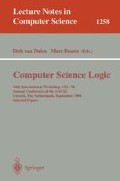Abstract
We propose and study coercive subtyping, a formal extension with subtyping of dependent type theories such as Martin-Löf's type theory [NPS90] and the type theory UTT [Luo94]. In this approach, subtyping with specified implicit coercions is treated as a feature at the level of the logical framework; in particular, subsumption and coercion are combined in such a way that the meaning of an object being in a supertype is given by coercive definition rules for the definitional equality. It is shown that this provides a conceptually simple and uniform framework to understand subtyping and coercion relations in type theories with sophisticated type structures such as inductive types and universes. The use of coercive subtyping in formal development and in reasoning about subsets of objects is discussed in the context of computer-assisted formal reasoning.
This work is partly supported by the UK EPSRC grant on ‘Subtyping, Inheritance and Reuse’ (GR/K79130).
Preview
Unable to display preview. Download preview PDF.
References
D. Aspinall and A. Compagnoni. Subtyping dependent types. Proc. of LICS96, 1996. To appear.
P. Aczel. Simple overloading for type theories. Draft, 1994.
A. Bailey. Lego with implicit coercions. 1996. Draft.
V. Breazu-Tannen, T. Coquand, C. Gunter, and A. Scedrov. Inheritance and explicit coercion. Information and Computation, 93, 1991.
M.J. Beeson. Foundations of Constructive Mathematics. Springer-Verlag, 1985.
K. Bruce and G. Longo. A modest model of records, inheritance, and bounded quantification. Information and Computation, 87, 1990.
R. Burstall and J. McKinna. Deliverables: a categorical approach to program development in type theory. LFCS report ECS-LFCS-92-242, Dept of Computer Science, University of Edinburgh, 1992.
R. Burstall. Extended Calculus of Constructions as a specification language. In R. Bird and C. Morgan, editors, Mathematics of Program Construction, 1993. Invited talk.
R.L. Constable et al. Implementing Mathematics with the NuPRL Proof Development System. Pretice-Hall, 1986.
L. Cardelli. Type-checking dependent types and subtypes. Lecture Notes in Computer Science, 306, 1988.
Th. Coquand. Pattern matching with dependent types. Talk given at the BRA workshop on Proofs and Types, Bastad, 1992.
Th. Coquand and Ch. Paulin-Mohring. Inductively defined types. Lecture Notes in Computer Science, 417, 1990.
L. Cardelli and P. Wegner. On understanding types, data abstraction and polymorphism. Computing Surveys, 17, 1985.
G. Dowek et al. The Coq Proof Assistent: User's Guide (version 5.6). INRIA-Rocquencourt and CNRS-ENS Lyon, 1991.
P. Dybjer. Inductive sets and families in Martin-Löf's type theory and their set-theoretic semantics. In G. Huet and G. Plotkin, editors, Logical Frameworks. Cambridge University Press, 1991.
H. Goguen. A Typed Operational Semantics for Type Theory. PhD thesis, University of Edinburgh, 1994.
R. Harper, F. Honsell, and G. Plotkin. A framework for defining logics. Proc. 2nd Ann. Symp. on Logic in Computer Science. IEEE, 1987.
G. Longo, K. Milsted, and S. Soloviev. A logic of subtyping. In Proc. of LICS'95, 1995.
Z. Luo and R. Pollack. LEGO Proof Development System: User's Manual. LFCS Report ECS-LFCS-92-211, Department of Computer Science, University of Edinburgh, 1992.
Z. Luo. ECC, an extended calculus of constructions. In Proc. of the Fourth Ann. Symp. on Logic in Computer Science, Asilomar, California, U.S.A., June 1989. IEEE.
Z. Luo. An Extended Calculus of Constructions. PhD thesis, University of Edinburgh, 1990. Also as Report CST-65-90/ECS-LFCS-90-118, Department of Computer Science, University of Edinburgh.
Z. Luo. A higher-order calculus and theory abstraction. Information and Computation, 90(1): 107–137, 1991.
Z. Luo. A unifying theory of dependent types: the schematic approach. Proc. of Symp. on Logical Foundations of Computer Science (Logic at Tver'92), LNCS 620, 1992. Also as LFCS Report ECS-LFCS-92-202, Dept. of Computer Science, University of Edinburgh.
Z. Luo. Program specification and data refinement in type theory. Mathematical Structures in Computer Science, 3(3), 1993.
Z. Luo. Computation and Reasoning: A Type Theory for Computer Science. Oxford University Press, 1994.
Z. Luo. Developing reuse technology in proof engineering. Proceedings of AISB95, Workshop on Automated Reasoning: bridging the gap between theory and practice, Sheffield, U.K., April 1995.
P. Martin-Löf. Intuitionistic Type Theory. Bibliopolis, 1984.
P. Martin-Löf. Analytic and synthetic judgements in type theory. In P. Parrini, editor, Kant and Contemporary Epistemology. Kluwer Accademic Publishers, 1994.
L. Magnusson and B. Nordström. The ALF proof editor and its proof engine. In Types for Proof and Programs, LNCS, 1994.
B. Nordström, K. Petersson, and J. Smith. Programming in Martin-Löf's Type Theory: An Introduction. Oxford University Press, 1990.
F. Pfenning. Refinement types for logical frameworks. Preliminary Proceedings of BRA Workshop on Types and Proofs, 1993.
R. Pollack. Implicit syntax. In the preliminary Proceedings of the 1st Workshop on Logical Frameworks, 1990.
R. Pollack. The Theory of LEGO: A Proof Checker for the Extended Calculus of Constructions. PhD thesis, Edinburgh University, 1994.
A. Saibi. Typing algorithm in type theory with inheritance. Draft, 1996.
Author information
Authors and Affiliations
Editor information
Rights and permissions
Copyright information
© 1997 Springer-Verlag Berlin Heidelberg
About this paper
Cite this paper
Luo, Z. (1997). Coercive subtyping in type theory. In: van Dalen, D., Bezem, M. (eds) Computer Science Logic. CSL 1996. Lecture Notes in Computer Science, vol 1258. Springer, Berlin, Heidelberg. https://doi.org/10.1007/3-540-63172-0_45
Download citation
DOI: https://doi.org/10.1007/3-540-63172-0_45
Published:
Publisher Name: Springer, Berlin, Heidelberg
Print ISBN: 978-3-540-63172-9
Online ISBN: 978-3-540-69201-0
eBook Packages: Springer Book Archive

